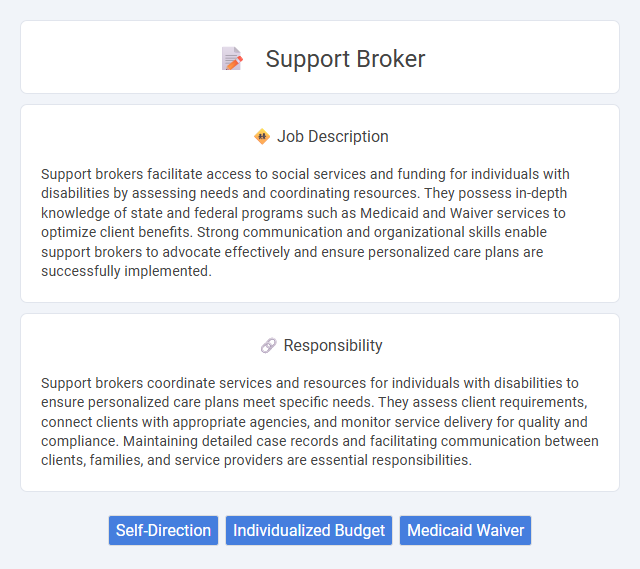
Support brokers facilitate access to social services and funding for individuals with disabilities by assessing needs and coordinating resources. They possess in-depth knowledge of state and federal programs such as Medicaid and Waiver services to optimize client benefits. Strong communication and organizational skills enable support brokers to advocate effectively and ensure personalized care plans are successfully implemented.
Support broker roles likely suit individuals who demonstrate strong empathy and effective communication skills, as they work closely with people needing assistance to navigate complex systems. Candidates who can handle high-pressure situations and maintain organizational skills may find this job more manageable and rewarding. Those with a natural inclination for problem-solving and advocacy are probably more successful in meeting the diverse needs of clients in this field.
Qualification
Support brokers require strong communication skills, experience in case management, and knowledge of community resources to effectively coordinate services for clients. A relevant qualification often includes a background in social work, psychology, or healthcare, complemented by certifications such as Certified Support Broker or Supported Decision-Making credentials. Expertise in client advocacy, problem-solving abilities, and familiarity with legal regulations related to disability and healthcare are essential for success in this role.
Responsibility
Support brokers coordinate services and resources for individuals with disabilities to ensure personalized care plans meet specific needs. They assess client requirements, connect clients with appropriate agencies, and monitor service delivery for quality and compliance. Maintaining detailed case records and facilitating communication between clients, families, and service providers are essential responsibilities.
Benefit
A support broker job likely offers significant benefits by enabling individuals to coordinate personalized care plans that enhance independence and quality of life. This role probably provides opportunities for professional growth through varied client interactions and problem-solving experiences. There is a strong chance employees receive competitive compensation and comprehensive benefits packages due to the specialized nature of the work.
Challenge
A support broker job likely involves navigating complex systems to secure necessary services for clients, which can present significant challenges. Managing diverse client needs and coordinating multiple service providers may require advanced problem-solving skills and adaptability. The probability of encountering bureaucratic obstacles and high-stress situations suggests that resilience and effective communication are essential for success in this role.
Career Advancement
Support broker jobs offer significant career advancement opportunities through developing expertise in coordinating services for individuals with disabilities and managing complex care plans. Gaining certifications such as Certified Support Broker (CSB) and building skills in client advocacy and resource management can lead to leadership roles and higher-paying positions within healthcare agencies or government programs. Advanced experience enables movement into strategic roles like program coordinator or policy advisor, expanding impact on community support systems.
Key Terms
Self-Direction
A support broker specializes in facilitating self-direction for individuals with disabilities, empowering them to design and manage their own support services. They assist clients in managing budgets, hiring personal care providers, and navigating regulations to promote independence and personalized care. Expertise in Medicaid waiver programs and local self-directed services regulations is essential for ensuring compliance and maximizing resource allocation.
Individualized Budget
Support brokers play a critical role in managing Individualized Budgets to ensure funds are allocated efficiently for personalized care plans. They collaborate with individuals to identify needs, coordinate services, and monitor spending to maximize the impact of the budget. Expertise in navigating Medicaid waivers and state-specific funding policies is essential for optimizing resource utilization within Individualized Budget frameworks.
Medicaid Waiver
Support brokers play a critical role in managing Medicaid Waiver programs by assisting individuals with disabilities to navigate and coordinate their personalized care plans. They help develop budgets, select service providers, and facilitate communication between clients and Medicaid agencies to ensure compliance and maximize available benefits. Expertise in Medicaid Waiver regulations and community resources is essential for support brokers to effectively empower clients and optimize service delivery.
 kuljobs.com
kuljobs.com